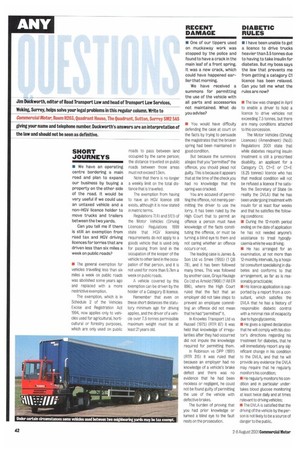DIABETIC RULES
Page 42

If you've noticed an error in this article please click here to report it so we can fix it.
• I have been unable to get a licence to drive trucks heavier than 3.5 tonnes due to having to take insulin for diabetes. But my boss says the law that prevents me from getting a category Cl licence has been relaxed. Can you tell me what the rules are now?
• The law was changed in April to enable a driver to hold a licence to drive vehicles not exceeding 7.5 tonnes, but there are many conditions attached to this concession.
The Motor Vehicles (Driving Licences) (Amendment) (No3) Regulations 2001 state that while diabetes requiring insulin treatment is still a prescribed disability, an applicant for a Category Cl, C1+E or C1+E (8.25 tonnes) licence who has that medical condition will not be refused a licence if he satisfies the Secretary of State (in reality the DVLA) that he has been undergoing treatment with insulin for at least four weeks and that he satisfies the following conditions: • During the 12-month period ending on the date of application he has not needed anyone's assistance to treat hypoglycaemia while he was driving; • He has arranged for an examination, at not more than 12-monthly intervals, by a hospital consultant specialising in diabetes and conforms to that arrangement, as far as is reasonably practicable; • His licence application is supported by a report from a consultant, which satisfies the DVLA that he has a history of responsible diabetic control with a minimal risk of incapacity due to hypoglycaemia; • He gives a signed declaration that he will comply with his doctor's directions regarding his treatment for diabetes, that he will immediately report any significant change in his condition to the DVLA, and that he will provide any evidence the DVLA may require that he regularly monitors his condition; • He regularly monitors his condition and in particular undertakes blood glucose monitoring at least twice daily and at times relevant to driving vehicles; • The DVLA is satisfied that the driving of the vehicle by the person is not likely to be a source of danger to the public.




















































































































